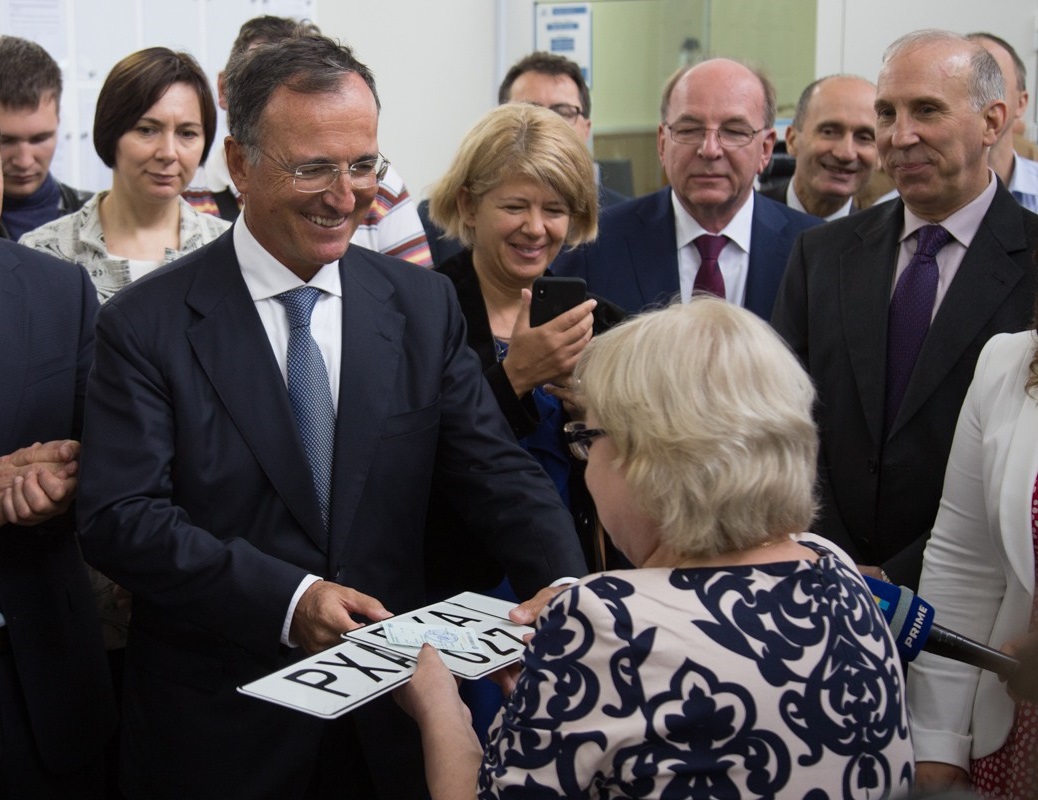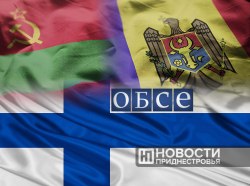Tiraspol, August 4. /Novosti Pridnestrovya/. One of the major issues at today's meeting of the PMR Foreign Ministry leadership with the Special Representative of the OSCE Chairman-in-Office Thomas Mayr-Harting was the situation around the neutral license plates mechanism. The situation has reached an impasse. Pridnestrovie is ready to restart vehicle registration points` work, as they say, "here and now." However, the Moldovan authorities are taking decisions that make this impossible.
It is obvious that the intervention of mediators is needed here, and above all the OSCE, which at one time played a prominent role in the emergence of the agreement itself on neutral license plates. On its part, there was financial participation, and also expert, political and diplomatic one. As a result, on September 10, 2018, the then Special Representative of the OSCE Chairman-in-Office, Franco Frattini, issued the first license plates of a neutral design in Tiraspol.
Today, this agreement is at risk. Will Thomas Mayr-Harting, the OSCE Mission and the entire OSCE Chairmanship-in-Office represented by North Macedonia be able to do something to save it?
How Do VRPs Work Now?
Recall that neutral license plates allow drivers from Pridnestrovie to freely travel outside the PMR and Moldova. They appeared after the corresponding protocol decision was signed by Tiraspol and Chisinau in 2018. Now you can see a lot of cars with such license plates in the PMR. According to the Ministry of Foreign Affairs of the Republic, 9,750 car owners have used the service since 2018.
Neutral plates are issued at Vehicle Registration Points (VRPs) in Tiraspol and Rybnitsa. Until the end of 2021, the VRPs operated in a fully functional mode. However, at the end of December 2021, the Moldovan security forces detained a batch of blanks for neutral and Pridnestrovian license plates. The neutral ones were returned a few months later. The court in Causeni ordered the return of the Pridnestrovian ones, yet this was never done. Relations between Tiraspol and Chisinau in the field of motor transport have become aggravated again. This also affected the work of the VRPs. The points began to function in a limited mode: new license plates were not issued, it was only possible to register the transfer of ownership (sale or inheritance) to those cars that already had neutral license plates, or to register the re-equipment of the car, for example, gas equipment installation. This is how the VRPs` work is now.
In the spring of this year, Pridnestrovie raised the issue of restarting registration points, returning them to normal mode. For this, they even removed the preliminary requirement for the return of blanks of the Pridnestrovian type. The Moldovan side was only offered one thing: to extend the validity of Law No. 170 of July 26, 2018. This law made it possible to register those cars that were imported into Pridnestrovie before September 2018 in the VRPs, that is, they were already in the republic by the time the mechanism with neutral license plates was launched. Now, in any case, it would be impossible to register such cars, since the Moldovan law ceased to have effect on September 1 last year. And not all motorists had time before this deadline.
According to the head of the main foreign policy department of the PMR Ministry of Foreign Affairs, Dmitry Palamarchuk, several appeals were sent to Chisinau on this issue. While Foreign Minister Vitaly Ignatiev proposed to the Deputy Prime Minister of the Republic of Moldova Oleg Serebryan the following algorithm at a meeting of political representatives on June 20: the Moldovan authorities put forward a project to extend the validity of law No. 170, inform Pridnestrovie about it, and after that, from a specific agreed date, the work of the VRPs are fully restored. Oleg Serebryan promised to consider the proposal, and the Pridnestrovian side then duplicated its initiative in an official letter.
Chisinau Against Pridnestrovian Car Owners
What did Chisinau do in practice? It did nothing. The initiative to extend the validity of the law has not been introduced, although, given the current Moldovan political realities, this could have been done both through the Parliament and through the Commission for Emergency Situations of the Republic of Moldova (especially since the leadership of the Moldovan Government should be directly aware of the situation with the VRPs, and PMR proposals).
Worse, as it later turned out, already at the time of the June meeting of political representatives, the order of the Director General of the Customs Service of the Republic of Moldova on the procedure for registering cars imported into Pridnestrovie after September 2018 was annulled. In order to register with the VRPs, such vehicles need a TV-24 customs form. But today it is no longer available. Most likely, Oleg Serebryan, who arrived at the meeting in Bendery on June 20, did not even know about it.
“In fact, the situation we have is this: we cannot register vehicles imported before September 2018, because the Moldovan law has not been extended, and those vehicles imported after September 2018 cannot be registered, since the order of the Customs Service of the Republic of Moldova has been cancelled. And even if we now unilaterally launch VRPs, nothing can be done there, apart from the services that are already being provided,” Dmitry Palamarchuk says.
When the Pridnestrovian Foreign Ministry learned about the cancellation of the order of the Customs Service of the Republic of Moldova, they immediately wrote a letter to Oleg Serebryan urging him to make efforts to return the situation to normal. The answer only arrived a month later and it was as follows: yes, indeed, the order was canceled. And that's it. It seems that the Moldovan political representative has no desire to understand the current situation.
On July 13, Minister of Foreign Affairs of the PMR Vitaly Ignatiev sent an appeal to the OSCE Chairman-in-Office Bujar Osmani, in which he stated that the agreement on neutral license plates is in a serious crisis and asked for assistance in maintaining it.
The VRPs are today the last mechanism from the Berlin Plus agreement adopted in 2016, which implies obligations of both parties and work on the principles of compatibility and reciprocity (neutral license plates are set by Pridnestrovie, while registration certificates are produced by Moldova). Without one of the parties, the VRPs will not be able to function as such.
What Next?
The very context of the Moldovan-Pridnestrovian negotiations not only remains difficult, but, as you know, continues to deteriorate. If we only take the past year, we can recall Moldova's withdrawal from the agreement on telecommunications, which was also part of the Berlin Plus agreement; the “law on separatism” and Chisinau's failure to fulfill its contractual obligations to close criminal cases against representatives of Pridnestrovie; fines for the lack of Moldavian CTP policies; the detention by Moldova of various goods for the PMR - medicines, food, as well as medical equipment. The issue with the tube for a CT scanner, which was being taken to the Tiraspol veterans' hospital and which was stopped at the Moldovan customs, for example, had not been resolved. Probably, the equipment will have to be returned to the manufacturer, since it will expire without being installed in the scanner.
Of the latter, it is worth noting the violation of the 2014 agreement and the introduction of fees for customs clearance of exports and imports for PMR enterprises. According to the Pridnestrovian economists` estimates, we can talk about millions of dollars that will fall into the Moldovan budget. Such requisitions will significantly complicate the life of the enterprises of the republic, some of them may be closed down.
Against this background, we are also observing the current situation around the VRPs. There is a feeling that Chisinau, for some irrational political reasons and motives, is breaking everything that is still left of the negotiation process (just like it is doing it today with the legal framework for cooperation with the CIS). One can only guess what all this will lead to, especially in the context of the militarization of Moldova. The question "what next?" remains open.
Vladimir Dmitriev








